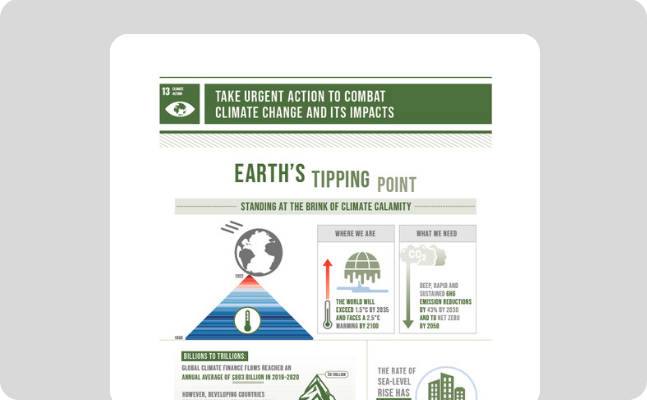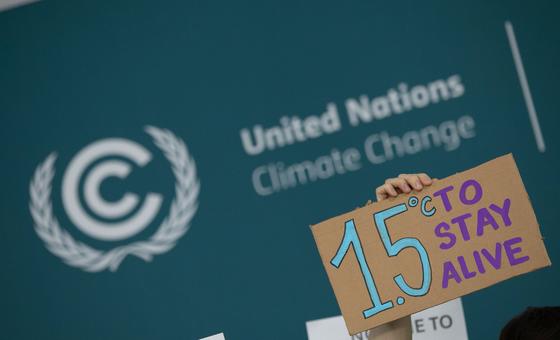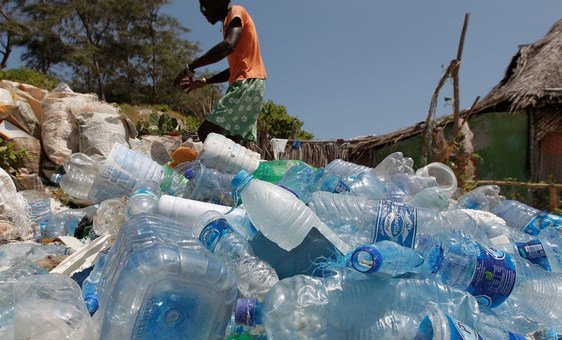Every person, in every country in every continent will be impacted in some shape or form by climate change. There is a climate cataclysm looming, and we are underprepared for what this could mean.
Climate change is caused by human activities and threatens life on earth as we know it. With rising greenhouse gas emissions, climate change is occurring at rates much faster than anticipated. Its impacts can be devastating and include extreme and changing weather patterns and rising sea levels.
If left unchecked, climate change will undo a lot of the development progress made over the past years. It will also provoke mass migrations that will lead to instability and wars.
To limit global warming to 1.5°C above pre- industrial levels, emissions must already be decreasing and need to be cut by almost half by 2030, just seven years away. But, we are drastically off track from this target.
Urgent and transformative going beyond mere plans and promises are crucial. It requires raising ambition, covering entire economies and moving towards climate-resilient development, while outlining a clear path to achieve net-zero emissions. Immediate measures are necessary to avoid catastrophic consequences and secure a sustainable future for generations to come.
Act Now
The climate crisis continues unabated as the global community shies away from the full commitment required for its reversal. 2010 – 2019 was the warmest decade ever recorded, bringing with it massive wildfires, hurricanes, droughts, floods and other climate disasters across continents.
Climate change is disrupting national economies and affecting lives and livelihoods, especially for the most vulnerable.
Between 2010 and 2020, highly vulnerable regions, home to approximately 3.3–3.6 billion people, experienced 15 x higher human mortality rates from floods, droughts and storms compared to regions with very low vulnerability.
What happens if you don’t take action?
If left unchecked, climate change will cause average global temperatures to increase beyond 3°C, and will adversely affect every ecosystem. Already, we are seeing how climate change can exacerbate storms and disasters, and threats such as food and water scarcity, which can lead to conflict. Doing nothing will end up costing us a lot more than if we take action now.
Solving the problem
To address climate change, we have to vastly raise our ambition at all levels. Much is happening around the world – investments in renewable energy have soared. But more needs to be done. The world must transform its energy, industry, transport, food, agriculture and forestry systems to ensure that we can limit global temperature rise to well below 2°C, maybe even 1.5°C. In December 2015, the world took a significant first step by adopting the Paris Agreement, in which all countries committed to take action to address climate change. However, more actions are critically needed in order to meet the targets.
Businesses and investors need to ensure emissions are lowered, not just because it is the right thing to do, but because it makes economic and business sense as well.
Are we investing enough to combat climate change?
According to the UNFCCC, global climate finance flows reached an annual average of $803 billion in 2019–2020, a 12 per cent increase compared to prior years. However, this still falls short of the levels needed to limit warming, and fossil-fuel-related flows exceeded climate financing for adaptation and mitigation in 2020.
In 2019, at least 120 of the 153 developing countries had undertaken activities to formulate and implement National Adaptation Plans to enhance climate adaptation and resilience, an increase of 29 countries over the previous year. Furthermore, progress in meeting the 2020 disaster risk reduction target has been slow.
What can I do to help?
There are many things that each of us can do as individuals. To find out what you can do, go to: www.un.org/en/actnow
To read more about the UN’s efforts on climate change: un.org/climatechange

- With a climate cataclysm looming, the pace and scale of current climate action plans are wholly insufficient to effectively tackle climate change. Increasingly frequent and intense extreme weather events are already impacting every region on Earth. Rising temperatures will escalate these hazards further, posing grave risks.
- The Intergovernmental Panel on Climate Change (IPCC) emphasizes that deep, rapid and sustained reductions in greenhouse gas (GHG) emissions are essential in all sectors, beginning now and continuing throughout this decade. To limit global warming to 1.5°C above pre- industrial levels, emissions must already be decreasing and need to be cut by almost half by 2030, just seven years away.
- Urgent and transformative action is crucial, going beyond mere plans and promises. It requires raising ambition, covering entire economies and moving towards climate-resilient development, while outlining a clear path to achieve net-zero emissions. Time is running out, and immediate measures are necessary to avoid catastrophic consequences and secure a sustainable future for generations to come.
13.1 Strengthen resilience and adaptive capacity to climate-related hazards and natural disasters in all countries
13.2 Integrate climate change measures into national policies, strategies and planning
13.3 Improve education, awareness-raising and human and institutional capacity on climate change mitigation, adaptation, impact reduction and early warning
13.A Implement the commitment undertaken by developed-country parties to the United Nations Framework Convention on Climate Change to a goal of mobilizing jointly $100 billion annually by 2020 from all sources to address the needs of developing countries in the context of meaningful mitigation actions and transparency on implementation and fully operationalize the Green Climate Fund through its capitalization as soon as possible
13.B Promote mechanisms for raising capacity for effective climate change-related planning and management in least developed countries and small island developing States, including focusing on women, youth and local and marginalized communities
*Acknowledging that the United Nations Framework Convention on Climate Change is the primary international, intergovernmental forum for negotiating the global response to climate change.
Climate Action Summit 2019
With global emissions are reaching record levels and showing no sign of peaking, UN Secretary-General António Guterres called on all leaders to come to New York on 23 September 2019 for the Climate Action Summit with concrete, realistic plans to enhance their nationally determined contributions by 2020, in line with reducing greenhouse gas emissions by 45 per cent over the next decade, and to net zero emissions by 2050.
Read the Report of the Secretary-General on the outcomes of the Summit.
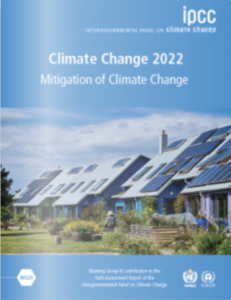
The Working Group III report provides an updated global assessment of climate change mitigation progress and pledges, and examines the sources of global emissions. It explains developments in emission reduction and mitigation efforts, assessing the impact of national climate pledges in relation to long-term emissions goals.
The Paris Agreement on climate change
The UN continues to encourage all stakeholders to take action toward reducing the impacts of climate change.
COP27: Egypt, 2022

From 6 to 18 November, Heads of State, ministers and negotiators, along with climate activists, mayors, civil society representatives and CEOs will meet in the Egyptian coastal city of Sharm el-Sheikh for the largest annual gathering on climate action.
The 27th Conference of the Parties to the United Nations Framework Convention on Climate Change – COP27 – will build on the outcomes of COP26 to deliver action on an array of issues critical to tackling the climate emergency – from urgently reducing greenhouse gas emissions, building resilience and adapting to the inevitable impacts of climate change, to delivering on the commitments to finance climate action in developing countries.
COP26: Glasgow, 2021
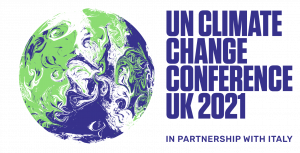
The UN Climate Change Conference in Glasgow (COP26) brought together 120 world leaders and over 40,000 registered participants, including 22,274 party delegates, 14.124 observers and 3.886 media representatives. For two weeks, the world was riveted on all facets of climate change — the science, the solutions, the political will to act, and clear indications of action.
The outcome of COP26 – the Glasgow Climate Pact – is the fruit of intense negotiations among almost 200 countries over the two weeks, strenuous formal and informal work over many months, and constant engagement both in-person and virtually for nearly two years.
COP25: Madrid, 2019
The Madrid Climate Change Conference – COP25 – brought the world together to consider ways to strengthen the implementation of the Paris Agreement. Taking place from 2 to 16 December in Madrid, the Conference came at a time when new data shows the climate emergency is getting worse every day, and is impacting people’s lives everywhere, whether from extreme heat, air pollution, wildfires, intensified flooding or droughts. Read our blogs from the Conference here.
COP22: Marrakesh, 2016
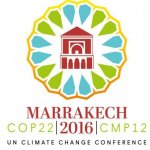 The 22nd session of the Conference of the Parties (COP 22) to the UNFCCC took place in Marrakesh, Morocco. During COP 22, parties began preparations for the entry into force of the Paris Agreement, and to encourage actions to implement the agreement that will address climate change.
The 22nd session of the Conference of the Parties (COP 22) to the UNFCCC took place in Marrakesh, Morocco. During COP 22, parties began preparations for the entry into force of the Paris Agreement, and to encourage actions to implement the agreement that will address climate change.
High-Level Event Towards Entry into Force: 21 September, 2016
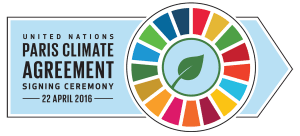 United Nations Secretary-General Ban Ki-moon convened a special “High-Level Event on Entry into Force of the Paris Agreement on Climate Change” on 21 September at the UN Headquarters in New York, to provide an opportunity to other countries to publicly commit to joining the Paris Agreement before the end of 2016.
United Nations Secretary-General Ban Ki-moon convened a special “High-Level Event on Entry into Force of the Paris Agreement on Climate Change” on 21 September at the UN Headquarters in New York, to provide an opportunity to other countries to publicly commit to joining the Paris Agreement before the end of 2016.
Paris Agreement Signing Ceremony, 22 April 2016
To keep the global spotlight focused on climate change and build on the strong political momentum from Paris, United Nations Secretary-General Ban Ki-moon invited representatives of all countries to sign the Paris Agreement on climate change at a special Ceremony at the United Nations Headquarters on 22 April.
COP21, 12 December 2015
The Paris Agreement was adopted by all 196 Parties to the United Nations Framework Convention on Climate Change at COP21 in Paris on 12 December 2015. In the agreement, all countries agreed to work to limit global temperature rise to well below 2 degrees Celsius, and given the grave risks, to strive for 1.5 degrees Celsius. Implementation of the Paris Agreement is essential for the achievement of the Sustainable Development Goals, and provides a roadmap for climate actions that will reduce emissions and build climate resilience.
Paris Agreement – Frequently Asked Questions
Related News
COP29 climate talks conclude with $300 billion annual pledge, but developing nations call deal ‘an insult’
Rich nations pledged to contribute at least $300 billion annually [...]
COP29 draft deal proposes wealthy nations give $250 billion in climate finance
A new draft finance deal delivered to harried negotiators in [...]
Global plastics treaty: UN experts call for centrality of human rights
Independent UN human rights experts said on Thursday that the [...]
Related Videos
Launch of Secretary-General’s Youth Advisory Group on Climate Change – 27 July
Building on the climate action momentum, the Secretary-General will launch his Youth Advisory Group on Climate Change on 27 July to amplify youth voices and to engage young people in an open and transparent dialogue as the UN gears up to raise ambition and accelerate action to address the climate crisis.
ActNow Climate Campaign – Chef Grace Ramirez
Chef Grace Ramirez talks about sustainability and green hacks in support of the UN's ActNow climate campaign.
Angry Birds 2 PSA in support of the ActNow Climate Campaign
The Department of Global Communications is partnering with Sony Pictures Entertainment and the UN Foundation for a second time on an initiative to promote the Sustainable Development Goal 13 – take urgent action against climate change and its impacts.


